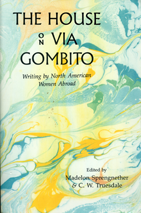Three or four time during my years of visiting Florence/Firenze, I’ve been driven by friends out of the city. There are places unreachable by train, bicycle, or easy autobus. The restaurant called Bibe’s is one of them. In the direction of Rome, passing through the Porta Romana, toward Galluzzo, the road to Bibe’s curves sharply down toward the river Greve. In Bibe’s garden frogs croak so loudly as to almost drown out the traffic, but in fact, there isn’t much traffic. Everyone who wanted to arrive sits on long tables in one of the many rooms hung with paintings from appreciative visitors. Or as I’ve always done, pull up metal chairs under flaring torches under the trees.
In 1937, the famous Italian poet and Nobel prize winner, Eugenio Montale visited Bibe’s and wrote a charming little poem to the host and hostess, parents of the current owner. It’s one of my favorite poems which I’ve mastered in Italian (truly penetrating a poem in another language is very difficult–no translation does justice to the nuances and sounds of the original. Nor would I in the next century grasp all the echoes that these lines created for Montale and his hosts).
The poem is titled “Bibe al Ponte dell’Asse.” Or Bibe, at the bridge of the Asse. (Don’t ask me why the bridge is called this since the river below it is the Greve. Or at least I think it is.) I’ll give you each line first in Italian, then my thoughts about translating it.
1. Bibe, ospite lieve, la bruna tua reginetta di Saba
Addressing Bibe, ospite meaning host and lieve meaning slight, but also echoing lieto/cheerful, moving on to la bruna, meaning a dark-haired woman and dubbing her Bibe’s reginetta di Saba or little queen of Sheba, or little queen of the Sabines, an ancient local tribe–think of the famous art historical subject: The Rape of the Sabine Women…
2. mesce sorrisi e Rufina di quattordici gradi
She mixes smiles and a country wine called Rufina to the 14th grade, which suggests its intensity,
3. Si vede in basso riluccere la terra fra gli aceri radi
You see below how the earth (terra) is relighted, literally riluccere, luce being light, among the scattered maples. I imagine Montale means that the river light bounces up onto the flickering maple leaves which then recast the light onto the ground.
4. E un bimbo curva la canna sul gomito della Greve
And a small child/bimbo (before the word was adopted in English for a saucy dame) curves his cane fishing pole over the elbow/gomito of the Greve.
Several of the charms of this poem in Italian are its mix of sounds which to my ear suggest flickering light: the “i’s” and “a’s” playing off each other, the rhymes within lines–Italian is veritably stuffed with rhyming sounds since almost all its words end in vowels which chime against the consonants. Montale mixes these rich sounds in an easy rhythm which flows with his attention from the bar and its Rufina and hostess down to the river light flickering from maple leaves and finally to the still silhouette of the child with its cane pole, ending as the elbow of the river carries us away.
Here is the poem without interruption:
Bibe, al Ponte dell’Asse
Bibe, ospite lieve, la bruna tua reginetta di Saba
mesce sorrisi e Rufina di quattordici gradi.
Si vede in basso rilucere la terra fra gli aceri radi
E un bimbo curva la canna sul gomito delle Greve.
Eugenio Montale 1937
All this is printed on a charming card beneath a sketch of Bibe’s–it’s one of my most treasured mementos of Florence.


Leave a Reply